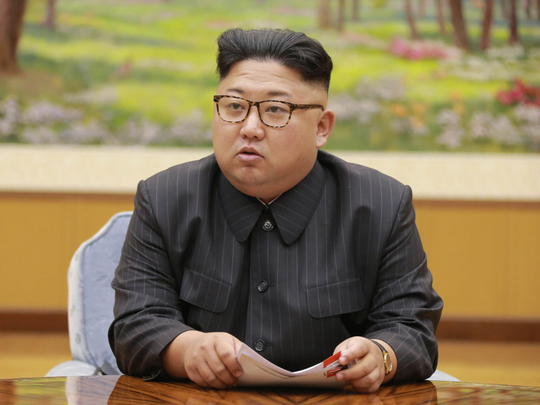
According to Christine Lu, “If you understand that dealing with people in China is all about face — giving face, getting face, saving face and not letting that person lose face — then you’re all covered.” For China and its President, Xi Jinping, North Korea’s latest nuclear test is a slap in the face.
Xi styles himself as the strongest Chinese leader since Mao, but North Korean leader Kim Jong-un has humiliated him repeatedly, for example by killing Kim family members who were close to Beijing. In the latest affront, North Korea’s sixth, and by far largest, nuclear test upstaged a Brics summit meeting that Xi hosted last week, and came just before next month’s crucial Chinese Communist Party Congress, where Xi hopes to consolidate further his hold on the country. The spectre of nuclear chaos is hardly consistent with the image of control that he seeks to project.
Xi is also attempting to manage China’s rise to the top tier of nations, but if the Middle Kingdom cannot keep an erstwhile tributary state in check, how can it credibly challenge great powers? It is often noted that China’s first interest with respect to North Korea is stability, and that it is therefore indulgent towards North’s provocations. The North’s barrage of missile tests, and its latest nuclear test, constitute grave threats to stability — which Beijing can no longer ignore.
China expressed “strong condemnation” of the North Korean test, but in the absence of any move to slash the 90 per cent of North Korean aid, trade and investment that it lavishes on Pyongyang, such statements simply look feeble and Xi cannot escape the ignominy. Pyongyang, not Beijing, is controlling the security agenda in Northeast Asia and it will cause profound changes that redound to China’s disadvantage.
The American agenda is clear. While neither negotiation nor military action are viable options to solve the North Korean nuclear threat, several conclusions are obvious. The United States and its allies in Japan and South Korea will grow closer. The stabilising presence of US forces in the region will be seen as even more important. Missile defences will be beefed up, to protect both US troops and allies in the region and the American homeland. Extended nuclear deterrence will become more salient. Secondary sanctions on businesses trading with North Korea — including those in China — will exact a toll.
Most important, if North Korea persists in keeping regional tensions near the boiling point, China’s cardinal interest in stability will be undermined. Good relations between Beijing and its neighbours will be stressed. Investment and economic activity will be depressed. China’s rust belt will suffer further from its proximity to the Hermit Kingdom. As the relative abundance of fissile material in North Korea grows, the nature and severity of the threat will too.
But there are options open to Beijing. North Korea is not viable without Chinese support, which accounts for about a third of North’s straitened economy. If the Chinese military and Communist Party made clear to their counterparts that they no longer see the Kim government as tenable, it soon would not be. In addition to Kim’s destabilising behaviour, Beijing may reflect that dynastic succession is inconsistent with Communism.
For too long, China has shielded and subsidised, coddled and enabled its thuggish ally. Even Russia seems to grasp the North Korean threat to international security. Last year, Moscow warned that, “Pyongyang should be aware of the fact that in this way, the DPRK [Democratic People’s Republic of Korea] will become fully opposed to the international community and will create international legal grounds for using military force against itself in accordance with the right of a state to self-defence, enshrined in the United Nations Charter.”
— Washington Post
William Tobey, a senior fellow at Harvard Kennedy School’s Belfer Centre for Science and International Affairs, was most recently deputy administrator for defence nuclear nonproliferation at the National Nuclear Security Administration.










